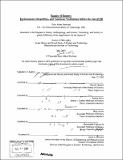Empire of energy : environment, geopolitics, and American technology before the age of oil
Author(s)
Shulman, Peter Adam
DownloadFull printable version (24.28Mb)
Other Contributors
Massachusetts Institute of Technology. Program in Science, Technology and Society.
Advisor
David I. Kaiser.
Terms of use
Metadata
Show full item recordAbstract
This dissertation asks how the United States physically built its global empire. Between 1840 and 1930, empire building involved the establishment of a network of naval bases and coaling stations. By focusing on energy, I reconceptualize the American overseas empire as neither inevitable nor geographically predetermined. I trace how coal shaped U.S. expansion, how this expansion influenced ideas about national security, and how these security concerns affected the global environment. Coal reveals continuities in American foreign relations that link overseas expansion to responses to the introduction of steam power into ocean travel. As the Navy sought coal, it progressively assembled the familiar contours of America's global reach. The dissertation addresses both global and local history. It shows how policy makers before the Civil War demonstrated tremendous creativity in initiating geological investigations, diplomatic arrangements, and commercial agreements in foreign territories. Between the Civil War and 1898, these approaches gradually gave way to a more singular effort by the Navy to control strategic ports around the world. Soon, coal was so central to the Navy that coaling strategy and technology formed a foundation for the education of elite officers at the Naval War College, where its study shaped the planning for future wars. Attention to Americans in Borneo, Japan, the Isthmus of ...
Description
Thesis (Ph. D. in History, Anthropology, and Science, Technology and Society (HASTS))--Massachusetts Institute of Technology, Program in Science, Technology and Society, June 2007. "May 2007." Includes bibliographical references (p. 298-318).
Date issued
2007Department
Massachusetts Institute of Technology. Program in Science, Technology and SocietyPublisher
Massachusetts Institute of Technology
Keywords
Program in Science, Technology and Society.